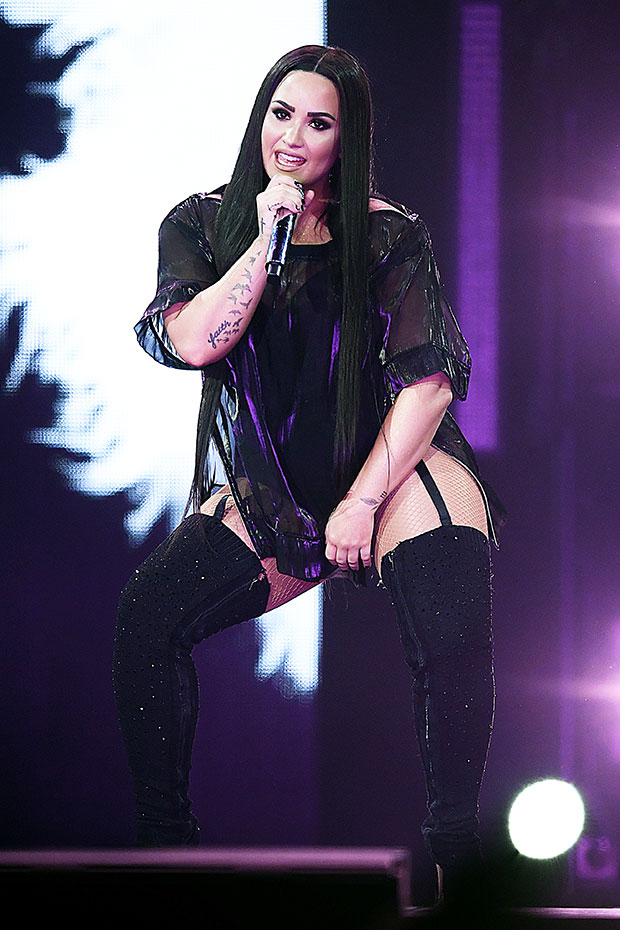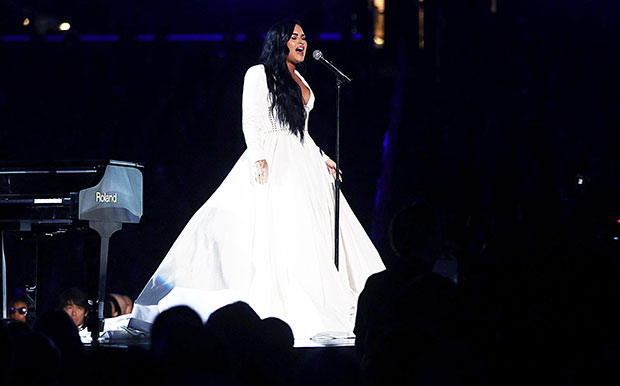After six years of sobriety, Demi Lovato found herself at a dark moment in March 2018. After two decades in show business, the then-26-year-old Demi was deeply depressed. So, she turned to a familiar comfort. “I remember thinking to myself, I don’t even know why I’m sober anymore. I’m so miserable,” the now 28-year-old singer/songwriter/actress said in her YouTube Originals docuseries, Demi Lovato: Dancing With The Devil (which premiered on March 23). “I picked up a bottle of red wine that night,” she said. 30 minutes later, she called up someone she knew that had drugs on them. “I’m surprised that I didn’t OD that night.”
Four months later, Demi was dying. On July 24, 2018, Demi was discovered unconscious by her then-assistant, Jordan Jackson. The singer had overdosed on opioids and was, according to Lovato, about “five to ten” minutes from death when the paramedics arrived. Jackson remembered watching them “try to bring her back to life. There was one point where she turned blue, like her whole body…I was like, she’s dead, for sure. It was the craziest thing I’ve ever seen,” per E! News. Demi was rushed to Cedars-Sinai Medical Center in Los Angeles, where she woke up legally blind in an intensive care unit. Demi spent the following two weeks in the hospital, but the effects of that night linger to this very day.

Dancing With The Devil is a “refocusing of her narrative,” per Billboard. Demi was filming a completely separate, now-shelved documentary at the time, originally meant to follow her around on her Tell Me You Love Me Tour. Now, the story will focus on Demi’s drug overdose in 2018, how she continues to deal with the effects of that near-fatal overdose while also giving Demi a chance to set the record straight.
Demi Lovato’s Drug Use
Demi’s history with substance abuse began in 2009, according to her 2017 YouTube documentary, Simply Complicated (h/t Glamour). In the doc, Demi said she was bullied in school and felt isolated, like an outcast. She made friends with a popular girl who claimed she had so many friends because she “partied.” This marked Demi’s introduction to drugs and alcohol.

It would be a relationship spurred on by a series of traumas and struggles. Demi, in Dancing With The Devil, claims that she “lost my virginity in a rape.” She developed an eating disorder(her bulimia “got so bad I started throwing up blood for the first time” as a teen). She dealt with mental health issues early on, famously getting diagnosed as bipolar at age 18, though she now claims it was a misdiagnosis, and she just has ADHD. Demi also dealt with coming to terms with her sexuality. Though her “Cool For The Summer” hit has been described as a sapphic love song, she wouldn’t fully embrace her queerness until 2020, following a failed engagement. Add in all the pressure of being a child superstar, and it’s a recipe for disaster and ruin.
By the time she was a teen, Demi was deep into her acting career, having landed a role on Barney & Friends and spots on series like Prison Break and Just Jordan. In 2007, she landed roles in Camp Rock and Sonny with a Chance. The first Camp Rock film arrived in 2008, which helped launch Demi’s singing career. She had four songs on the soundtrack, and her first two albums — Don’t Forget and Here We Go Again — would arrive in 2008 and 2009, respectively.
In 2009, the year Sonny with a Chance debuted on the Disney Channel, Demi tried cocaine for the first time. “I was scared because my mom always told me your heart could just burst if you do it, but I did it anyway,” she said. “And I loved it.”
In November 2010, at age 18, Demi entered a treatment center over self-harm, an eating disorder, and other issues. She also had a physical altercation with a backup dancer. “Demi has decided to take personal responsibility for her actions and seek help,” her rep said in a statement at the time. “She is doing just that. Demi and her family ask that the media respect her privacy during this difficult time.
Demi left rehab in January 2011, but the treatment didn’t stick. “I wasn’t working my program. I wasn’t ready to get sober,” she said in Simply Complicated. “I was sneaking [cocaine] on planes, sneaking it in bathrooms, sneaking it throughout the night—nobody knew. I was either craving drugs or on drugs. I was not easy to work with.”
Her drug use continued until spring 2012. The night before an American Idol appearance, Demi invited two “random people” to her hotel room, where she got incredibly drunk. At the start of 2013, after several months of sobriety, she checked into a Los Angeles sober house. “Getting sober was difficult,” she said to Glamour in 2016. “I went into rehab, I came out, and I didn’t stay sober. I still had issues occasionally. Now some days, it’s difficult; some days, it’s easy.” The sobriety would last for six years until her relapse in early 2018.
“I just so happened to run into my old drug dealer from six years before and, like, the odds of that happening were crazy,” she says in Dancing With The Devil. “He had a duffel bag, and I just went to town. I went on a shopping spree. That night I did drugs that I’d never done before. I had never done meth before. I tried meth. I mixed it with molly, with coke, weed, alcohol, oxycontin. And that alone should’ve killed me.”
During this relapse, Demi was “introduced to heroin and crack cocaine.” She soon became reliant on the opioid. “I started using recreationally, and obviously, you can’t do that with heroin before you become addicted to it,” said Demi. She managed to keep her addiction in check during the Tell Me You Love Me World Tour but picked up when she returned to Los Angeles. She continued to use drugs “heavily,” unbeknownst to her friends, family, and team.
Repercussions of Drug Use and Overdose

Like the ripples on a pond after a single drop of water, Demi continues to experience the effects of July 24, 2018. “I don’t think people realize how bad I actually was,” said Demi in Dancing With The Devil. To those blessed without knowing the pain of the opioid epidemic in the United States, the term “overdose” is an abstract concept. Sadly, more and more people are realizing the drug’s severity firsthand. Two out of three drug overdoses in 2018 involved an opioid, according to the CDC, and overdose deaths involving opioids have increased almost six times since 1999. Overdoses involving opioids killed nearly 47,000 people in 2018, with 32% of those deaths involving a prescription opioid.
Demi was given heroin “laced with fentanyl” the night of her overdose. She claims that she didn’t just overdose but that she was sexually assaulted by her drug dealer. “When they found me, I was naked, blue. I was literally left for dead after he took advantage of me,” she says in the doc. “When I woke up in the hospital, they asked if we had had consensual sex. There was one flash that I had of him on top of me. I saw that flash, and I said yes. It wasn’t until a month after the overdose that I realized, ‘You weren’t in any state of mind to make a consensual decision.’ ”
The trauma of the sexual assault is sadly just one of the lingering effects. Demi was left with irreversible harm. “I had three strokes. I had a heart attack. I suffered brain damage from three strokes,” she said. She can’t drive a car anymore because of “blind spots” in her vision. “So sometimes when I go to pour a glass of water, I’ll like, totally miss the cup because I can’t see it anymore. I also had pneumonia because I asphyxiated and multiple organ failure.”
Moving Forward
“I wish I could say that the last night I ever touched heroin was the night of my overdose, but it wasn’t,” Demi said about her overdose in episode three of Dancing With The Devil, per E! News. After a “week-long intensive trauma retreat,” she called her dealer and “ended up getting high.” Afterward, she was “mortified” that she decided to do the “same drugs that put me in the hospital.”
It was a wake-up call that ushered in a new chapter for Demi. After taking time to recover and heal, she returned to the stage at the 2020 Grammy Awards. In her first performance since her near-death experience in 2018, Demi debuted “Anyone,” a song recorded for days before her overdose. The following week, she sang the national anthem at the 2020 Super Bowl. Throughout the year, she released a handful of songs – “I Love Me,” “I’m Ready” with Sam Smith, “OK Not to be OK” with Marshmello, “Still Have Me,” and “Commander In Chief.” In conjunction with her new docuseries, Demi announced Dancing with the Devil…the Art of Starting Over, a new album scheduled for April 2, 2021.

In Dancing, Demi revealed that she’s not substance-free. She allows herself to smoke cannabis and indulge in alcohol in moderation. “Allowing myself to eat a Mexican pizza from Taco Bell, I found freedom in my eating disorder,” she said in the doc, per The New York Times, while noting that this approach isn’t for everyone. “But it was so all-or-nothing and dogmatic with sobriety that I was just like, I don’t know how to live in total balance of my life.”
“I haven’t been by-the-book sober since the summer of 2019,” she said. “I realized if I don’t allow myself some wiggle room, I go to the hard sh-t. And that will be the death of me.”
In 2021, Demi has embraced herself. She’s openly queer (“I’m not willing to put a label on it right this second, and I think I will get there”) and confident that she’s on the right path to health and happiness. “I’m still on a journey to finding myself,” she says in her docuseries. “More will come about that in time.”


